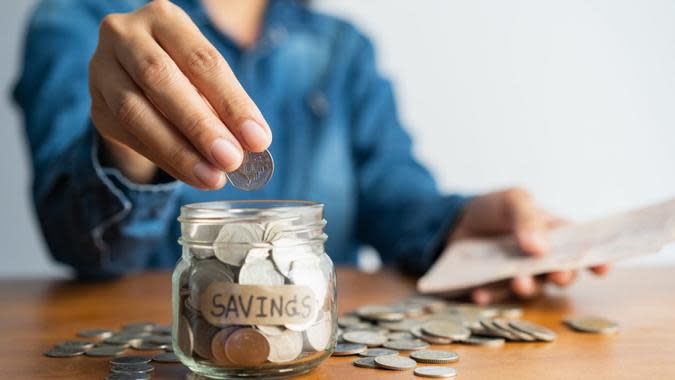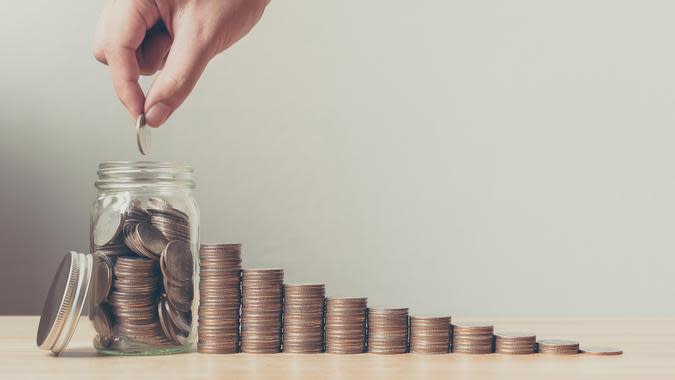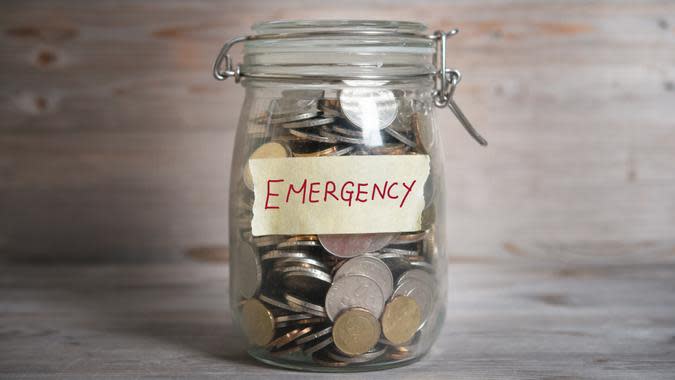Why Inflation Shouldn’t Keep You From Saving for an Emergency Fund

If you currently feel like your financial situation has become a juggling act -- one where you are paying off debt, budgeting and strategizing how to keep saving and investing any remaining money -- you're not alone. Inflation rates accelerated to 8.5% in March 2022, with prices surging everywhere from the grocery store to pumps at the gas station. Rising costs are impacting all Americans, especially those in low-income brackets, and some may be unable to set aside money for this fund.
Good To Know: 7 Financial Habits That Improve Your Daily Life
And More: 50 Ways You're Throwing Money Away
How can we go from being unable to save for emergencies to actively contributing to an emergency fund? The key is to develop, and achieve, a savings lifestyle.

Developing a Culture of Saving in 7 Steps
Tania Brown, CFP and financial coach for SaverLife, said a key part of building a solid savings foundation during times of inflation is developing a "culture of savings." This is also known as a savings lifestyle, which is an intentional, consistent commitment to living off less than what you make and making saving money a priority.
Keep reading for the seven steps that allow you to achieve a savings lifestyle.
Take GOBankingRates' Poll: Where Have You Cut Back Most Because of Inflation?

1. Write Down Your Why for Saving
Brown said most economists see inflation increasing in 2022. If things cost more, there's less money to save and it becomes more difficult to stay motivated as to why you are saving.
Get clear on your "why" for saving so you know how to prioritize your money. Brown recommends writing down your reason for saving money. Then, write down how you will feel when you achieve your savings goals. The answer can be as simple as peace of mind or no longer worrying about money.
It's also good practice to write down how you will feel if you don't achieve your savings goals.
"For some, it may be the pain of remaining in the same situation. For others, the stress of living from paycheck to paycheck," Brown said.

2. List What You Want To Save For
As prices continue to rise everywhere, everything has become more expensive and you may need to increase how much you save for different expenses.
Start by writing how much money you would like to save for emergencies. Brown said this is called "Peace of Mind Money." This type of money is set aside for major events, like a sudden job loss.
Another critical area to focus on are sinking funds.
"A sinking fund is short-term savings you use to pay for future expenses like car or home repairs," Brown said.
List upcoming expenses along with the amount of money you would like to save for each expense over the next year. You can use sinking funds to pay for upcoming expenses like holiday shopping, gifts and travel.

3. Come Up With Your Starter Savings Plan
Where will you put your savings toward an emergency fund? Brown said ideally, this fund should be kept in a no-fee bank account that is separate from your checking account.
Once you know where your fund is and what you are saving for, Brown said to plan for how much you will save each month.
"I suggest starting with an amount you know you can easily save. This can be $5 a week, $10 every two weeks, or $20 a month," Brown said. "The key is to start with the amount you can save easily. Then, you can commit to slowly increasing your savings monthly by at least $5 a month."

4. Plan For Extra Money in Advance
Extra money, sometimes called a windfall, may arrive in the form of a tax refund or a bonus at work. If you know you may receive extra money, pre-plan for it and where you may best allocate the extra funds in advance.

5. Protect Yourself From Emotional Self-Sabotage
Don't give in to the urge to spend recklessly or feel the need to keep up with the Joneses. Brown recommends automating your savings into an emergency fund so the money automatically transfers there and it is out of sight and out of mind
Another helpful approach to saving for an emergency fund is to give yourself rules in advance for when you will use your savings. Brown uses the example that you can set a rule that you will only use your savings to cover emergencies like unusually high medical bills, your car and home repairs.

6. Change From a Debt to a Saving Mindset
In a saving mindset, debt is the last resort and not the first option unlike a debt mindset. If you're currently in a debt mindset, Brown recommends changing over to a saving mindset. This is the mindset that commits to paying off credit card balances each month, says no to purchases that aren't within a budget and treats savings like a bill.

7. Get the Entire Family Involved
Those saving for an emergency fund with a partner or children should talk about the fund with their family.
If you don't have children and are in a relationship, talk to your partner about saving for an emergency fund. "If you are a saver and your spouse is a spender, make it a game," Brown said. "If you hit your savings goals, half of any extra goes into savings, and then have fun with the other half."
Those with children are encouraged to talk to their kids about saving. Brown recommends using the phrase "it's not in the budget" instead of saying "we can't afford it" or "I don't have the money."
"Explain what a budget is, that you plan for spending, so kids learn how to plan. It's a great way to begin teaching them about managing money," Brown said.
As you start to hit your financial goals, remember to celebrate the small wins. Consider treating everyone in the family to a budget-friendly treat like ice cream every time you save $100 for your emergency fund.

Why an Emergency Fund Matters
Living in a time of economic uncertainty, challenging as it may be, is the best reason to prioritize saving for an emergency fund.
"Your best defense against the craziness of life is savings," Brown said. "Savings prevents unexpected expenses from becoming future debt. Taking the time to create your own savings lifestyle will go a long way to help you build financial security and teach your kids valuable lessons to help them achieve financial security as adults."
More From GOBankingRates
This article originally appeared on GOBankingRates.com: Why Inflation Shouldn’t Keep You From Saving for an Emergency Fund

 Yahoo Movies
Yahoo Movies 
